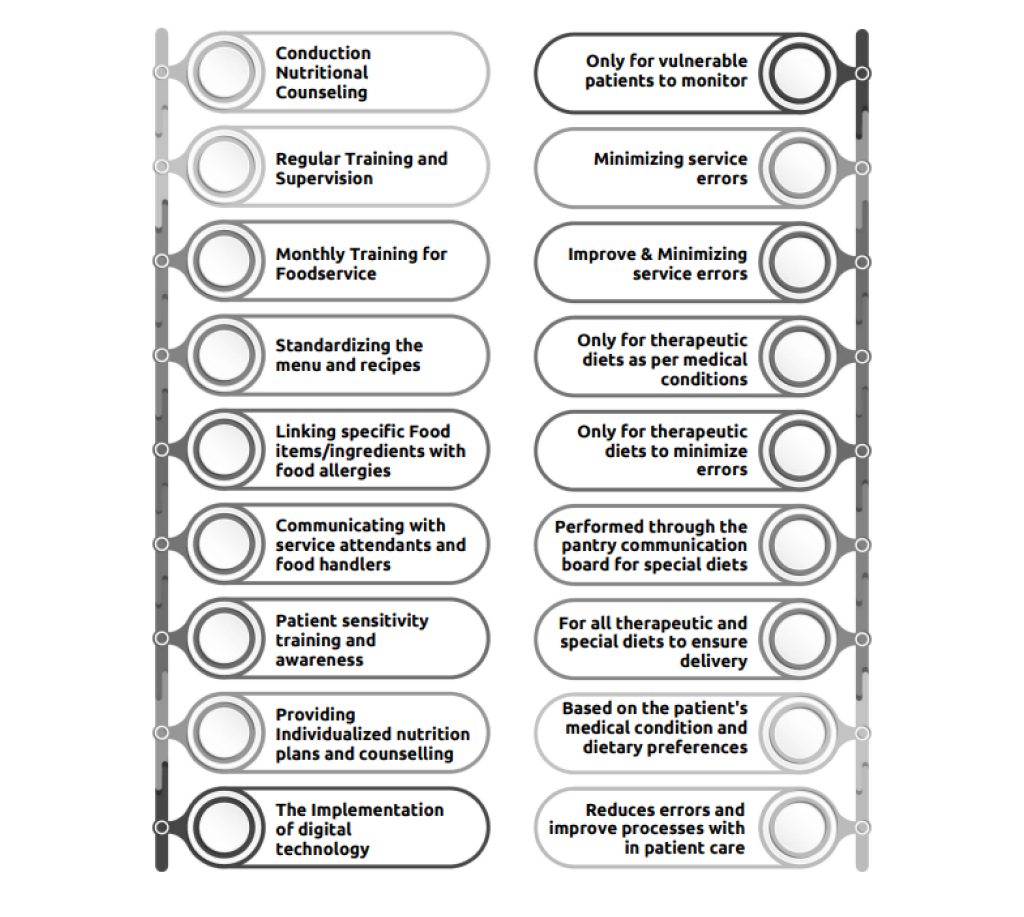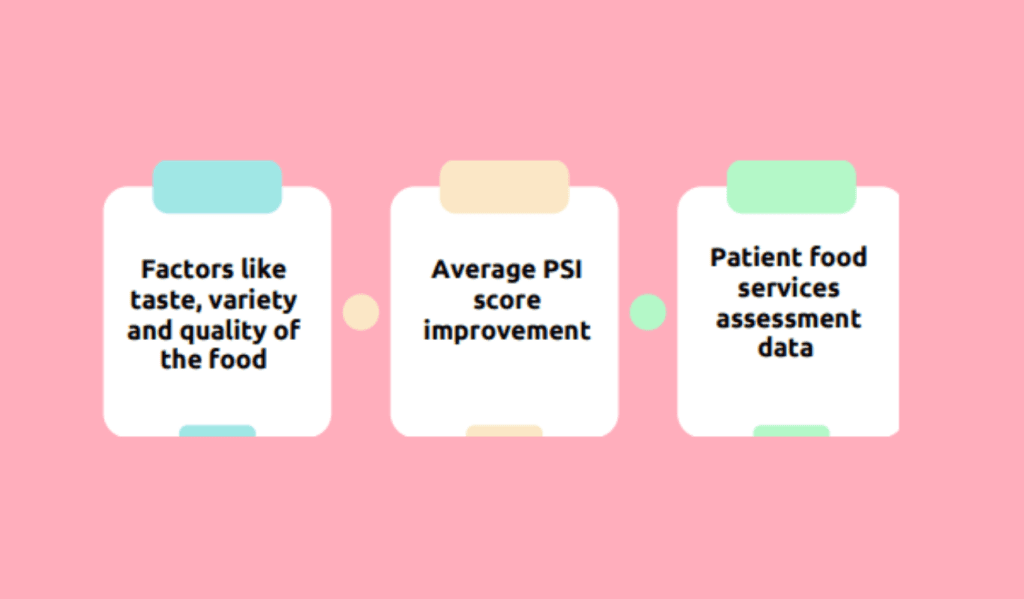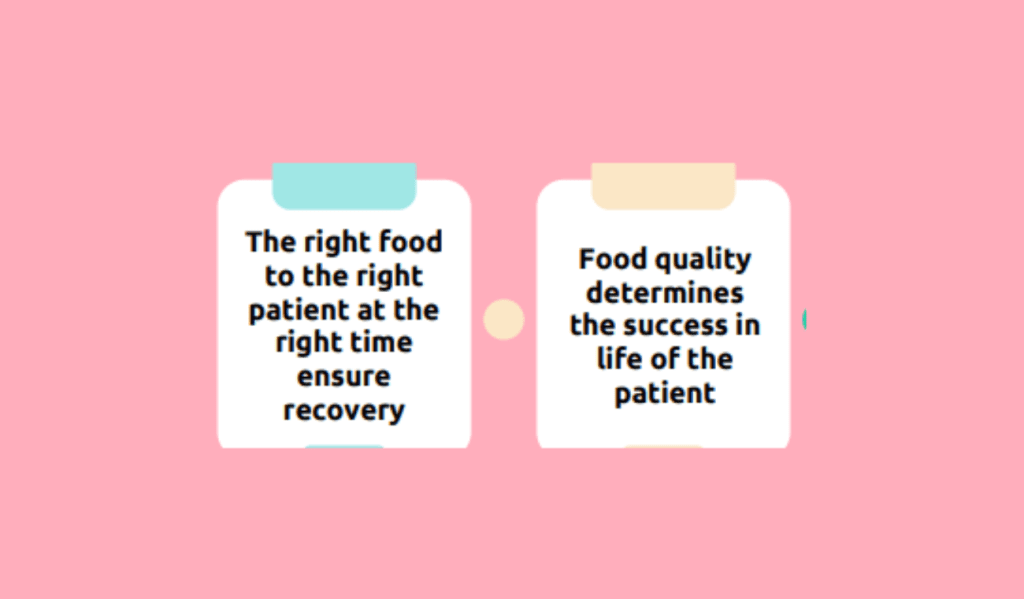Food as Therapy: Enhancing Patient Outcomes through Nutritional Care
Read the Magazine in PDF
Abstract :
P.D. Hinduja Hospital & Medical Research Centre is a major multi-speciality tertiary care hospital in India that focuses on giving patients the correct nutrition at the right time. Low patient satisfaction index values at the hospital prompted examining quality indicators and identifying patient satisfaction as a vital part of healthcare delivery. Dietary mistakes were identified as a concern, and efforts to prevent them were introduced, including the construction of an electronic system, customised diets and counselling, continual training for food handlers, and data gathering to maintain service faults. The hospital has also taken efforts to secure and duplicate the improvement by expanding similar training programmes to other stakeholders and ensuring excellent communication and documentation.
Organizational Profile:
P.D. Hinduja Hospital & Medical Research Centre is a leading multi-speciality tertiary care hospital in India. With over 70 years of experience, the institution has two units in Mahim and Khar, equipped with state-of-the-art infrastructure and staffed by top-rated doctors. P.D. Hinduja Hospital, Mahim, was one of the first hospitals in the country to adopt advanced technology such as the fully integrated Robotics System, Gama Knife, Digital Broadband MRI, and True Beam Linear Accelerator. It has earned accreditation and certification from NABH, CAP, and ISO and has established partnerships with leading international institutes to promote research and excellence in healthcare. The hospital has received numerous awards for being the Best Multi-Specialty Hospital from various industry bodies and has been ranked as the No. 1 hospital in western India by Newsweek’s World’s Best Hospital Survey. In addition, the hospital provides free or subsidized treatment to those in need and operates the Serve with Passion rural health program.
Introduction:
Providing the proper nutrition to patients at the appropriate time in a hospital is a collective effort. The dietician collaborates with the treating consultant to identify the best diet for the patient, while the nursing and food service departments collaborate to ensure that patients receive meals adapted to their health circumstances to promote recovery and good health. Several essential control points are in place to guarantee that patients continue on a Favourable road to recovery. In this sense, patient happiness and viewpoint are significant multidimensional notions. During a routine monthly assessment, it was discovered that Patient Satisfaction Index (PSI) values were low. Analysis revealed a favourable association between patient satisfaction levels and quality indices, among other things. It was determined that patient satisfaction is a critical aspect of ensuring optimal healthcare delivery.
Moreover, food allergies, therapeutic diets, special dietary requirements, bed transfers, and diet transitions are all critical areas that can impact the proper provision of food service in a hospital setting. Changing a patient’s diet at any time during the day without effective written communication to all stakeholders can lead to the patient receiving an inappropriate diet. Therefore, it is essential to ensure that all dietary changes are effectively communicated to all relevant parties to appropriately meet the patient’s nutritional needs.
And it is essential to understand that food is a crucial component in medical and nutritional therapy, and dietary changes are often necessary. These changes must be conveyed promptly and effectively through written orders during or after the dietician’s or consultant’s rounds to ensure that the right food is provided to the right patient without errors. Failure to provide written communication may result in patients receiving the wrong diet. Several Factors contribute to a lack of written communication, such as changes not being mentioned in the medical folder or entries made by the dietician not being saved due to technical issues with Wi-Fi connectivity.
Errors can occur at any point in the dietary process, from assessment to meal service at the patient’s bedside. As food allergies and special diets are growing concerns in hospitals, it is crucial to take timely corrective and preventive actions. Implementing a solution is insufficient to ensure breakthrough performance, and training and periodic audits are necessary to evaluate the effectiveness of the new process.
Outcome:
The solution to the problem (Table 1).

Securing and sustaining the progress is an essential stage in the process of enhancing quality: Locking in the improvement is a critical step in the quality improvement process to achieve breakthrough performance, and the following are the steps taken to do so:
- An electronic system has been developed through IT and the Dieto App developer to minimize errors.
- Customized diets and counselling are provided to patients as per their medical conditions and preferences.
- Continuous training is provided to food handlers through the SAHAYAK programme to minimize errors.
- Data collection has been started to maintain service errors and take corrective actions if necessary.
To replicate the improvement, the following steps are taken:
- Extending similar training programs to all stakeholders, including housekeeping and nursing staff.
- Process improvement, effective communication, and proper documentation are crucial for end-to-end error- free service.
- Housekeeping attendants can serve diets to patients after receiving proper training and strict supervision from their department heads.


Conclusion
In a hospital context, providing proper nourishment to patients is a joint endeavour that necessitates excellent communication and coordination across several departments. Errors in the provision of dietary services can be caused by a lack of effective communication and documentation, which can harm patients’ health outcomes and satisfaction levels.
P.D. Hinduja Hospital & Medical Research Centre has undertaken a variety of techniques to address these challenges, including the construction of an electronic system, customized diet and counselling, continual training for food handlers, and data collection to reduce service faults. These solutions have resulted in measurable gains, such as increased patient satisfaction and decreased service faults. Furthermore, by expanding comparable training programs to other stakeholders, the hospital hopes to replicate its achievements and provide error-free service from start to finish.




